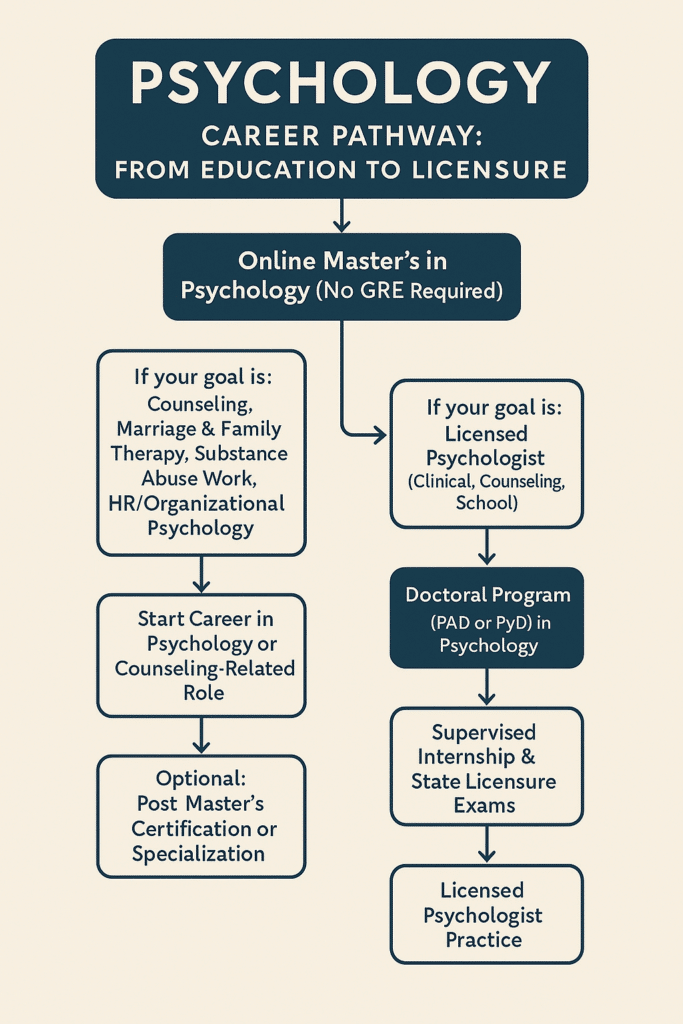Many universities now offer online master’s in psychology programs with no GRE required, making graduate education more accessible than ever. Whether you’re advancing your current role or changing careers, these programs remove the stress of standardized testing while offering the flexibility of online learning.
This guide covers everything you need to know about online psychology master’s programs that don’t require the GRE. We’ll explore typical curriculum formats, the benefits of skipping the GRE, examples of schools offering no-GRE options, job opportunities for graduates, salary expectations, and tips to afford your degree.
If you’re ready to take the next step in psychology without taking the GRE, this article will help you find the right path.
What Are Online Master’s in Psychology Programs with No GRE Requirement?
Online psychology master’s programs that don’t require the GRE offer a more accessible path to graduate school. As more universities shift toward holistic admissions, they prioritize factors like undergraduate GPA, work experience, and personal statements over standardized test scores.
These no-GRE programs open doors for students who may not perform well on standardized exams or who are returning to school after time in the workforce. By removing this hurdle, more students can pursue advanced degrees in psychology and begin or advance their careers.
What’s the Difference Between GRE vs. No-GRE Psychology Master’s Programs?
When choosing an online master’s in psychology program, one of the biggest differences you’ll encounter is whether or not the GRE is required. Here’s a side-by-side comparison to help you determine which path best fits your goals, strengths, and timeline.
| Feature | GRE-Required Programs | No-GRE Programs |
|---|---|---|
| Standardized Test Requirement | GRE score is required as part of the admissions process | No GRE required; admissions focus on holistic review |
| Focus of Admissions | Heavier emphasis on test scores, GPA, and academic metrics | Emphasis on experience, GPA, personal statement, and recommendations |
| Flexibility | Often more structured or traditional formats | Designed for working adults and non-traditional students |
| Accessibility | May be more competitive and limited in format | More accessible and widely available online |
| Time to Apply | Requires extra prep time for GRE | Faster application process — no test prep or exam scheduling |
| Program Type | Common in research-heavy or on-campus programs | Common in professional, practitioner-focused, and online programs |
| Career Outcomes | Similar — both lead to master’s-level psychology careers | Similar — no difference in licensure eligibility or salary potential |
💡 Tip: Choosing a no-GRE program does not mean sacrificing quality — many accredited, respected universities now offer no-GRE psychology master’s degrees online.
Who Should Consider a No-GRE Online Psychology Master’s Program?
No-GRE psychology master’s programs offer flexibility and accessibility that appeal to a wide range of students. If you’re wondering whether a no-GRE option is the right fit, consider the following profiles — if any sound like you, these programs may be ideal.
✅ 1. Working Professionals Returning to School
If you’re balancing a full-time job, family responsibilities, or other obligations, a no-GRE online program allows you to:
- Skip the time-intensive GRE prep
- Apply sooner and start learning faster
- Choose flexible, asynchronous formats designed for adult learners
✅ 2. Career Changers
Are you pivoting into psychology from a different field? No-GRE programs often welcome diverse professional backgrounds and focus on:
- Real-world experience
- Academic motivation
- A compelling personal statement — not just test scores
✅ 3. Students with Strong GPAs But Weak Test-Taking Skills
If your undergraduate performance is solid but standardized testing isn’t your strength, a GRE-free admissions process allows your:
- Academic record
- Letters of recommendation
- Personal goals
…to shine without the pressure of a single exam.
✅ 4. First-Generation or Non-Traditional Students
Many no-GRE programs are built to support:
- First-gen college students
- Adult learners
- Students who may not have the resources or time to prepare for high-stakes testing
✅ 5. Applicants Seeking Fast Admissions
Want to apply quickly or take advantage of rolling admissions? No-GRE programs:
- Simplify the application checklist
- Eliminate test score reporting delays
- Often have more frequent start dates
🧠 Bottom line: If you value flexibility, accessibility, and a holistic admissions process, a no-GRE online psychology program may be the perfect way to pursue your graduate education and career goals.
Typical Curriculum in a No-GRE Online Master’s in Psychology Program
Most no-GRE online master’s programs in psychology include coursework in:
- Developmental Psychology
- Social and Abnormal Psychology
- Cognitive and Behavioral Psychology
- Research Methods and Advanced Statistics
- Ethics in Psychology
- Applied Practicum or Capstone Project
Students may also choose concentrations such as clinical psychology, forensic psychology, or industrial-organizational psychology, depending on the program.
Benefits of Earning a Master’s in Psychology Online
Online master’s in psychology programs offer unmatched flexibility and convenience for today’s busy students. Whether you’re working full time or managing family responsibilities, online learning allows you to earn your degree without pausing your life.
Top advantages of flexible, online psychology programs include:
- Cost savings: Reduce expenses on commuting, campus housing, and student fees.
- Work-life balance: Continue working or caring for family while pursuing your education.
- Learn at your own pace: Many programs offer asynchronous formats so you can access materials anytime.
- Access top programs nationwide: Study at leading psychology schools without having to relocate.
- Diverse peer network: Engage with students from across the country, bringing a wide range of perspectives to discussions.
Admission Requirements for No-GRE Online Master’s in Psychology Programs
While these programs eliminate the need for GRE scores, the rest of the application requirements for online master’s in psychology programs without the GRE remain similar to traditional graduate programs. Many schools now focus on academic performance, experience, and personal fit.
Most no-GRE psychology grad programs require:
- Bachelor’s degree from an accredited college or university
- Official transcripts, often showing undergraduate coursework in psychology or related fields
- Letters of recommendation from academic or professional references
- Statement of purpose explaining your academic goals, interests in psychology, and career plans
- Professional resume or CV, especially highlighting relevant work or volunteer experience in the field
2026 Best No-GRE Online Master’s in Psychology Programs
Choosing the right online master’s in psychology program with no GRE requirement depends on your academic background, learning preferences, and long-term career goals. While there’s no one-size-fits-all solution, we’ve compiled a list of strong programs that meet these criteria and offer excellent flexibility, curriculum quality, and student support.
Use the list below as a starting point, and be sure to research other no-GRE psychology master’s programs online that may better suit your unique needs.
Looking for strategies to evaluate programs? Don’t miss the search tips after the list.
Auburn University
Program Overview: Auburn University’s online MS in Industrial/Organizational (I/O) Psychology is designed to provide students with the skills and knowledge needed to address challenges in organizational and work settings. Delivered entirely online and asynchronously, the program equips students to work as I/O practitioners in applied settings.
Credits: 30 credit hours (including core courses, electives, and a practicum)
Duration: 2 years (5-6 semesters)
Highlights:
- Core courses in I/O psychology, such as Personnel Selection, Training and Development, and Ethics and Professional Issues
- Flexible scheduling with fall, spring, and summer options
- Transfer credit options available
- Adheres to Society of Industrial/Organization Psychology (SIOP) guidelines
Admissions Requirements:
- Bahcelor’s degree with a 3.0 GPA
- Personal statement
- Two letters of recommendation
- GRE not required
Pepperdine University
Online MA in Clinical Psychology
Program Overview: Pepperdine University’s online MA in Clinical Psychology program prepares students to become licensed professional clinical counselors (LPC) or licensed marriage and family therapists (LMFT). The program is designed to help individuals, couples, and families overcome emotional and psychological challenges. With flexible online delivery, students learn from distinguished faculty and complete the same curriculum and clinical placements as on-campus students.
Credits: 62-68 units
Duration: As few as 27 months
Licensure Paths:
- LPC Path: Focus on mental health diagnosis, treatment, and serving a broad audience.
- LMFT Path: Specialize in family dynamics, marriage issues, and parent-child conflicts.
Highlights:
- No GRE required
- 8-12 course sessions
- 4 sessions of field placement
Purdue Global
Master of Science in Psychology
Program Overview: Purdue Global’s online Master of Science in Psychology program integrates foundational psychological theory with modern applications in a variety of fields. Students can choose from four concentrations based on their career aspirations, and the program also offers practicum opportunities for hands-on experience.
Credits: 60 credit hours
Duration: Varies by student course load
Concentrations:
- Addictions: Prepares students to meet coursework requirements for the NAADAC Master Addictions Counselor (MAC) examination.
- Forensic Psychology: Focuses on the intersection of psychology and law, preparing students for roles in the criminal and civil legal systems.
- General Psychology: Offers broad training in neuropsychology, cognitive psychology, and behavioral approaches.
- Industrial/Organizational Psychology: Applies psychological principles to workplace settings, focusing on organizational behavior and human resources.
Highlights:
- NAADAC Approved Education Provider (Addictions concentration)
- Practicum courses available
- No GRE required
Admissions: Bachelor’s degree required
Southern New Hampshire University
Online Master of Science (MS) in Psychology
Program Overview: Southern New Hampshire University’s (SNHU) online MS in Psychology program is designed to provide a deep understanding of psychological principles and research methods. The program emphasizes practical applications of psychological theory and is suitable for students interested in working in diverse settings, including hospitals, schools, and government facilities. This program is not intended for those pursuing clinical licensure.
Credits: 36 credit hours
Duration: Can be completed in as little as 15 months
Concentrations:
- Child and Development Psychology
- Forensic Psychology
- Industrial-Organizational Psychology
Highlights:
- Courses in cognitive psychology, research methods, and social psychology
- Focus on ethics, empathy, and practical problem-solving
- No GRE required
Touro University Worldwide
Online Master’s in Industrial & Organizational Psychology
Program Overview: Touro University Worldwide’s online MA in Industrial & Organizational Psychology program prepares professionals to enhance organizational performance by focusing on employee behavior, communication, and workplace productivity. This 100% online program allows students to specialize in one of three areas: Coaching and Consulting, Human Resource Management, or Occupational Health Psychology. The program can be completed in as little as 12 months and does not lead to licensure.
Credits: 36 credit hours
Duration: 12 months (with full-time enrollment)
Concentrations:
- Coaching and Consulting
- Human Resource Management
- Occupational Health Psychology
Highlights:
- No GRE required
- 6 start dates per year
- 8-week course sessions
Tips for Researching No-GRE Online Master’s in Psychology Programs
To find the best online psychology master’s programs that don’t require the GRE, use trusted sources and follow these research tips to ensure you’re making an informed decision:
- Use College Scorecard: This official U.S. Department of Education tool lets you compare colleges by cost, graduation rate, and available degree programs. Visit College Scorecard
- Explore the IPEDS Database: The Integrated Postsecondary Education Data System (IPEDS) offers in-depth information on college programs, tuition, and enrollment. Explore IPEDS
- Accreditation Bodies: Check whether programs are accredited by recognized agencies such as the American Psychological Association (APA) for doctorate-level psychology programs. The Council for Higher Education Accreditation (CHEA) can help verify institutional accreditation.
- Review College Websites Directly: University websites are the most reliable source for up-to-date details on admissions requirements, GRE policies, and financial aid options.
How to Choose the Right No-GRE Online Psychology Master’s Program
When comparing online master’s in psychology programs that don’t require the GRE, it’s important to consider both your academic goals and long-term career plans. Use this checklist to help evaluate your top choices:
- Program availability: Does the school offer your desired specialization, such as clinical, forensic, or industrial-organizational psychology?
- Cost and financial aid: Compare tuition rates and factor in available scholarships, grants, or assistantships.
- Admissions requirements: Even without the GRE, some programs may require relevant undergraduate coursework, a certain GPA, or work experience in psychology.
- Format and location: Is the program fully online, or are on-campus residencies or internships required? Make sure the delivery model fits your schedule and lifestyle.
- Accreditation: Ensure the program is accredited by a recognized body. This is crucial if you plan to pursue licensure after graduation.
- Licensure alignment: Check if the curriculum meets licensure requirements in your state, especially if you plan to become a licensed counselor or psychologist.
- Faculty expertise and student support: Look into the faculty’s background, research interests, and availability for mentorship. Also evaluate student services like career counseling or practicum placement support.
By taking these factors into account, you’ll be better equipped to find a no-GRE online psychology program that supports both your academic and professional goals.
🎓 Understanding Accreditation for Online Psychology Master’s Programs
Before enrolling in any online psychology master’s program — especially one that doesn’t require the GRE — it’s essential to ensure the program is properly accredited. Accreditation is the #1 factor that determines whether your degree will be respected by employers, licensure boards, and other graduate schools.
✅ Why Accreditation Matters
- Ensures program quality and academic rigor
- Qualifies you for federal financial aid (FAFSA)
- Impacts eligibility for state licensure in fields like counseling or therapy
- Signals to employers that your degree is legitimate
🏛️ Types of Accreditation to Look For
1. Institutional (Regional or National Accreditation)
This applies to the college or university as a whole. For psychology programs, regional accreditation is preferred and more widely accepted.
- Look for regional accrediting bodies such as:
- Middle States Commission on Higher Education (MSCHE)
- Higher Learning Commission (HLC)
- New England Commission of Higher Education (NECHE)
- …and others listed by the U.S. Department of Education or CHEA
💡 Tip: If a school isn’t regionally accredited, be cautious — credits may not transfer, and your degree may not be accepted for licensure.
2. Programmatic Accreditation (for Doctoral Programs)
The American Psychological Association (APA) accredits doctoral psychology programs — not master’s degrees.
- APA accreditation does not apply to master’s-only programs
- Instead, look for institutional accreditation and any state approvals related to counseling or therapy licensure
🧩 How to Verify Accreditation
- Search the school in the CHEA Database: www.chea.org
- Visit the U.S. Department of Education’s accreditation search: ope.ed.gov
- Check the school’s website under “Accreditation” or “About Us” sections
- Confirm that the school’s accreditation is listed and currently active
🚨 Accreditation Red Flags
- “Accredited” by unknown or unrecognized organizations
- No mention of accreditation on the school’s official website
- Vague promises like “nationally recognized” without specifics
- Tuition discounts in exchange for fast sign-up (common with diploma mills)
🧠 Bottom Line: Make sure your chosen no-GRE online psychology master’s program is from a regionally accredited institution. That’s what ensures your degree is respected, transferable, and eligible for licensure.
What Jobs Can You Get with an Online Master’s in Psychology (No GRE)?
Graduating from a no-GRE online master’s in psychology program can open doors to many fulfilling careers. While some roles—like licensed clinical psychologist—require a doctoral degree, a master’s degree alone qualifies you for a wide range of impactful jobs across mental health, education, business, and human services.
Here are some top job roles you can pursue:
Roles Requiring a Master’s Degree:
- Substance Abuse Counselor
Help individuals overcome addiction by guiding them through treatment and developing healthier coping strategies. Often employed in rehab centers, hospitals, or private practice. A master’s degree is typically sufficient for licensure in most states.
Behavioral Health Specialist
Work with patients facing emotional or behavioral disorders by creating treatment plans and offering therapeutic support. Common workplaces include hospitals, clinics, and social service agencies.
Industrial-Organizational Psychology Assistant / HR Consultant
Apply psychology in workplace settings to improve employee well-being and performance. Many roles in organizational development, human resources, and training are available with a master’s degree.
Marriage and Family Therapist (MFT)
Provide therapy to couples and families navigating relationship issues. Licensure requires a master’s degree plus supervised experience and state exams.
Human Resources Specialist
Use your psychology background to manage recruitment, conflict resolution, and employee development. Particularly suited for those who studied industrial-organizational psychology.
✅ Note: Most of these careers require state-specific licensure or certifications, so always check local requirements.
Psychology Careers That Usually Require a Doctoral Degree
Some psychology careers require a PhD or PsyD, along with licensure, and are not accessible with only a master’s degree. These clinical roles typically involve assessment, diagnosis, and long-term therapy.
Here are common doctoral-level psychology careers:
- Clinical Psychologist
Diagnose and treat mental, emotional, and behavioral disorders. Requires a doctoral degree (PhD or PsyD) plus state licensure. This is one of the most common long-term goals for students continuing beyond a master’s.- Clinical psychologists diagnose and treat mental, emotional, and behavioral disorders. This career requires a PhD or PsyD, in addition to licensure, and is a common goal for students pursuing further education beyond a master’s degree.
- Counseling Psychologist
Help clients navigate life challenges, such as relationship issues or anxiety. Like clinical psychologists, this role requires a doctorate and licensure to practice independently. - School Psychologist
Work within K–12 school systems to support students’ mental health and academic development. Most roles require a specialist degree (EdS) or doctorate, although some states allow master’s-level professionals to practice with certification.- School psychologists work within educational systems to support students’ emotional and behavioral well-being, typically requiring a specialist or doctoral degree. Some states allow those with a master’s degree to practice with specific certifications.
Psychology Career Pathway: From Education to Licensure
Use this step-by-step roadmap to understand how a master’s in psychology fits into the broader journey — whether your goal is counseling, organizational psychology, or becoming a licensed psychologist.
🎓 Step-by-Step Education & Career Flowchart

💡 Notes for Students
- ✅ You don’t need a doctoral degree to start working in many psychology-related careers.
- 📌 Licensure requirements vary by state and by job type — check your local board for MFT, LPC, or behavioral health roles.
- 🧠 An online, no-GRE master’s program is a strong step toward careers in mental health, education, business, or public service.
Psychology Master’s Degree Salary & Job Outlook (No GRE Required)
Graduates of no-GRE online master’s in psychology programs can access a wide range of high-impact and well-paying careers. The GRE is only used in admissions and has no bearing on future earnings or career potential.
📈 Job Outlook for Psychology Professionals
According to the U.S. Bureau of Labor Statistics (BLS), employment for psychologists is expected to grow by 7% from 2023 to 2033, faster than the national average. Key drivers include increased demand for mental health services in schools, hospitals, and the workplace.
💼 Average Salaries for Psychology Roles (2023 BLS Data)
- Substance Abuse, Behavioral Disorder, and Mental Health Counselors
Median salary: $53,710
Roles available with a master’s in psychology, often requiring licensure. - Industrial-Organizational Psychology Roles
Median salary (PhD-level): $147,420
Master’s-level starting roles (e.g., HR or org development): $70,000–$90,000 - Marriage and Family Therapists (MFTs)
Median salary: $58,510
Requires licensure but available with a master’s. - School Psychologists
Median salary: $84,940
Usually requires a doctoral or specialist degree, but some states allow master’s-level roles with additional certification.
🎓 Doctoral-Level Psychology Careers
- Clinical and Counseling Psychologists
Median salary: $96,100
Top 10% earn more than $150,000/year
Requires a PhD or PsyD, plus licensure.
🚀 Fast-Growing Job Sectors for Psychology Graduates
- Healthcare and Hospitals: Especially for behavioral health and counseling services.
- K–12 and Higher Education: Rising demand for mental health professionals in schools.
- Corporate Settings: Growing interest in employee well-being is fueling roles in industrial-organizational psychology.
💰 Psychology Career Salary Comparison by Degree Level
| Career | Degree Required | Median Salary (2023) | Notes |
|---|---|---|---|
| Substance Abuse / Mental Health Counselor | Master’s | $53,710 | Licensure required; available with a no-GRE master’s in psychology |
| Marriage and Family Therapist (MFT) | Master’s + Licensure | $58,510 | Master’s-level role with additional training and supervised hours |
| School Psychologist | Ed.S. or Doctoral (some Master’s) | $84,940 | Some states allow master’s-level roles with certification |
| Industrial-Organizational Psychologist | Doctoral (some Master’s) | $147,420 (PhD) | Master’s-level roles start around $70,000–$90,000 in HR/consulting |
| Clinical/Counseling Psychologist | Doctoral (PhD or PsyD) | $96,100 | Top 10% earn over $150,000; not accessible with master’s alone |
✅ Takeaway for No-GRE Master’s Students
While the highest-paying roles typically require a doctorate, a master’s in psychology—especially from a no-GRE program—can still lead to meaningful and well-paying careers, especially in counseling, therapy, and organizational settings.
How to Pay for an Online Psychology Master’s Degree (No GRE Programs Included)
Worried about how to afford grad school? Here are 7 smart ways to fund your online psychology master’s degree, including for no-GRE programs. These options can make your education more affordable and reduce long-term debt.
1. Federal Financial Aid
Complete the Free Application for Federal Student Aid (FAFSA) to access federal student loans and potential work-study opportunities.
- Direct Unsubsidized Loans: Available regardless of income. Interest accrues while enrolled.
- Graduate PLUS Loans: Covers full cost of attendance; requires a credit check.
2. Scholarships and Fellowships
Apply for merit-based or need-based funding from schools, associations, and private foundations.
- Psychology-specific scholarships: Check with the APA, NASP, or other professional organizations.
- University aid: Many online programs offer automatic or competitive scholarships.
3. Employer Tuition Assistance
Ask your HR department if tuition reimbursement is part of your benefits.
- Tuition reimbursement: Some employers cover up to 100% in exchange for a post-grad work commitment.
4. Private Student Loans
Only consider these after exhausting federal options.
- Compare lenders: Look for low interest rates, flexible repayment, and minimal fees.
5. Grants and Assistantships
Some hybrid or research-heavy online programs offer assistantships or grant-funded roles.
- Assistantships: May come with a stipend and partial tuition coverage.
- Grants: Search for funding from mental health or education-related foundations.
6. Military and Veterans Benefits
Eligible students can use the GI Bill or Yellow Ribbon Program to pay tuition and receive housing stipends.
7. Tuition Payment Plans
Many schools offer interest-free installment plans to break tuition into manageable payments across a semester or academic year.
FAQ on No GRE Online Master’s in Psychology Programs
Do all online master’s in psychology programs require the GRE?
No, many online master’s in psychology programs do not require the GRE. Instead, schools are shifting toward holistic admissions, considering factors like your undergraduate GPA, work experience, letters of recommendation, and personal statement. Always check the specific admissions criteria for each program.
Can I become a licensed psychologist with a master’s degree?
In most states, becoming a licensed psychologist requires a doctoral degree (PhD or PsyD). However, a master’s in psychology can qualify you for other licensed roles such as:
- Substance abuse counselor
- Marriage and family therapist (with licensure)
- Behavioral health counselor
- Industrial-organizational psychology consultant
Licensure requirements vary by state, so confirm the rules where you plan to practice.
How long does it take to complete an online master’s in psychology?
Most online psychology master’s programs take 18–24 months to complete. Timelines depend on whether you enroll part-time, full-time, or choose an accelerated track.
What can I do with a master’s in psychology?
Graduates of no-GRE online psychology master’s programs can pursue roles such as:
- Substance abuse counselor
- Behavioral health specialist
- Human resources specialist
- Marriage and family therapist (with additional licensure)
- Industrial-organizational psychology assistant
Doctoral degrees are required for roles like clinical or counseling psychologist.
Are online psychology degrees as respected as on-campus degrees?
Yes. Online psychology degrees from accredited institutions are generally viewed as equivalent to on-campus degrees by employers and licensing boards. Accreditation ensures academic quality and credibility — always verify that the program is recognized by a reputable accrediting agency.
🎓 Making the Right Choice for Your Future
Choosing an online master’s in psychology program with no GRE requirement offers flexibility, accessibility, and the opportunity to grow professionally. By carefully evaluating factors such as cost, format, accreditation, and career outcomes, you can choose a program that fits your goals — whether that’s entering the workforce or continuing on to a doctoral degree.
A psychology master’s degree can be a meaningful step toward a rewarding and impactful career.




